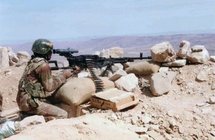
Undated handout picture released by the Yemeni army in November 2009 (AFP/Yemeni Army/File)
The statement came on the heels of an announcement from the rebels on Monday that they would withdraw from Saudi territory they had occupied since November.
Huthi, who said he was renewing his acceptance of the Yemeni government's conditions, had previously expressed willingness to end the fighting. But this was the first time he said directly that he would accept Sanaa's terms.
Among the government demands are the withdrawal of rebels from official buildings, the reopening of roads in the north, the return of weapons seized from security services and the release of all military and civilian prisoners.
Huthi also said the government's offensive against the rebels had accomplished "none of its objectives" since it was begun in August.
And he urged Yemeni soldiers to "show themselves to be free men, if only once," by refusing to attack the rebels.
Last September President Ali Abdullah Saleh said the government was ready to fight the rebels for "years," although he also said hostilities could end if the Zaidis themselves agree to a ceasefire.
He spoke at a celebration marking the anniversary of the 1962 revolution that overthrew the Zaidi Shiite spiritual leadership and established the republic, and after two separate ceasefires lasted just a few hours before fighting erupted again.
The Zaidi rebels, also known as Huthis, have been engaged in sporadic clashes with government forces since 2004.
The latest round of fighting broke out on August 11, when the military launched "Operation Scorched Earth," an all-out assault against the rebels.
Saudi Arabia joined the fighting on November 4, a day after Huthi forces killed a Saudi border guard and occupied two villages inside Saudi territory.
The Zaidis, whose faith is an offshoot of Shiite Islam, are a minority in mainly Sunni Yemen but the majority community in the north. President Saleh is himself a Zaidi.
The UN refugee agency warned on Friday that a humanitarian crisis in north Yemen was getting worse as the number of people displaced by the conflict has grown to about 250,000.
The office of the UN High Commissioner for Refugees said the fighting has moved gradually from Saada city farther northwest, while more people were fleeing the province because they could not sustain themselves.
"The humanitarian crisis in Yemen is deepening and we now estimate that 250,000 civilians have been displaced since the country’s internal conflict flared in 2004," UNHCR spokesman Andrej Mahecic said.
"This represents a more than doubling of the number displaced as of August 2009 when the latest round of fighting erupted," he told journalists.
The tally of displaced from the area, which is near the border with Saudi Arabia, has grown by about one fifth in just over two weeks.
About 12,000 of them have sought shelter in the capital Sanaa, according to the UN agency.
The international Red Cross warned on Monday that the worsening impact of the conflict was largely neglected.
-----------------------------------------------------------------------------------------------------------
Huthi, who said he was renewing his acceptance of the Yemeni government's conditions, had previously expressed willingness to end the fighting. But this was the first time he said directly that he would accept Sanaa's terms.
Among the government demands are the withdrawal of rebels from official buildings, the reopening of roads in the north, the return of weapons seized from security services and the release of all military and civilian prisoners.
Huthi also said the government's offensive against the rebels had accomplished "none of its objectives" since it was begun in August.
And he urged Yemeni soldiers to "show themselves to be free men, if only once," by refusing to attack the rebels.
Last September President Ali Abdullah Saleh said the government was ready to fight the rebels for "years," although he also said hostilities could end if the Zaidis themselves agree to a ceasefire.
He spoke at a celebration marking the anniversary of the 1962 revolution that overthrew the Zaidi Shiite spiritual leadership and established the republic, and after two separate ceasefires lasted just a few hours before fighting erupted again.
The Zaidi rebels, also known as Huthis, have been engaged in sporadic clashes with government forces since 2004.
The latest round of fighting broke out on August 11, when the military launched "Operation Scorched Earth," an all-out assault against the rebels.
Saudi Arabia joined the fighting on November 4, a day after Huthi forces killed a Saudi border guard and occupied two villages inside Saudi territory.
The Zaidis, whose faith is an offshoot of Shiite Islam, are a minority in mainly Sunni Yemen but the majority community in the north. President Saleh is himself a Zaidi.
The UN refugee agency warned on Friday that a humanitarian crisis in north Yemen was getting worse as the number of people displaced by the conflict has grown to about 250,000.
The office of the UN High Commissioner for Refugees said the fighting has moved gradually from Saada city farther northwest, while more people were fleeing the province because they could not sustain themselves.
"The humanitarian crisis in Yemen is deepening and we now estimate that 250,000 civilians have been displaced since the country’s internal conflict flared in 2004," UNHCR spokesman Andrej Mahecic said.
"This represents a more than doubling of the number displaced as of August 2009 when the latest round of fighting erupted," he told journalists.
The tally of displaced from the area, which is near the border with Saudi Arabia, has grown by about one fifth in just over two weeks.
About 12,000 of them have sought shelter in the capital Sanaa, according to the UN agency.
The international Red Cross warned on Monday that the worsening impact of the conflict was largely neglected.
-----------------------------------------------------------------------------------------------------------









 Home
Home Politics
Politics









